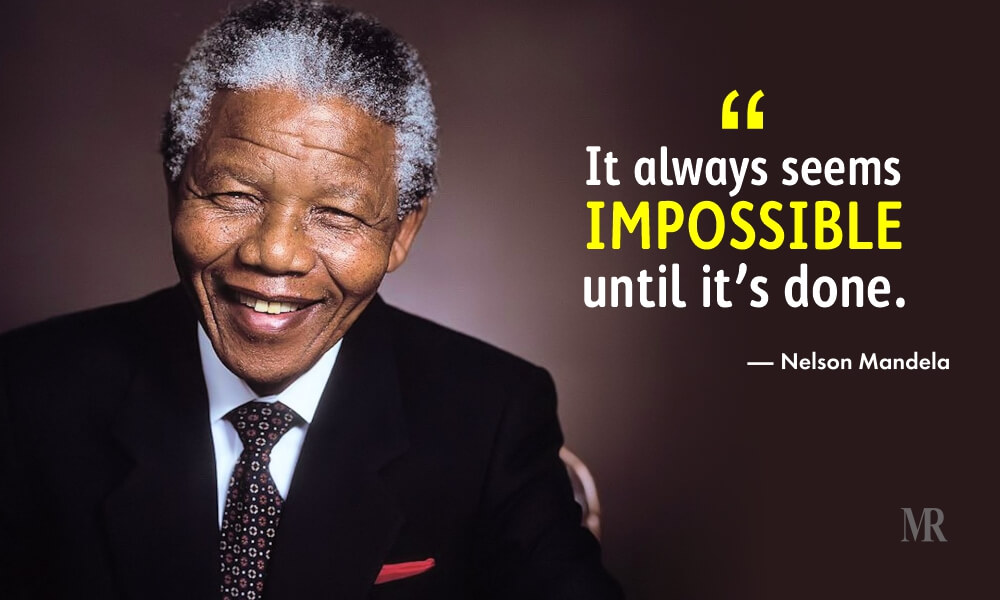Be the Peer

I was reading the biography of Nelson Mandela, “Long Walk to Freedom.” There was a part in the book when he was an outlaw. He snuck out of the country to go to a meeting with other political groups who were fighting for equality in Africa.
He said that he felt a strange sensation. He saw that the pilot was black. He actually felt like he shouldn’t trust a black pilot. He had to stop himself and realize that even he, a lawyer who put every ounce of his being into freeing blacks from oppression was hypnotized by the negative conditioning of his culture. Blacks weren’t inferior, it was their oppressors who brainwashed them to believe it.
Hold on a second, Nelson Mandela, one of the most impenetrable persons who ever lived, someone who went to jail for years and came out being the president of the country that tried to oppress him, almost fell into the negative mentality that his people were inferior?
I had to ask myself if I have fallen into this trap, besides my ideals and commitment to mindfulness, and maybe I have here and there. I was told being a girl means I should never lift heavy weights or exert myself too much. At a ripe age of 8 or 9, I was told I could never be a dancer. When I hurt my back, I was told I may never run again. I was told I could never spin a quan dao (ancient kung fu weapon) behind my back because I’m lacking fingers. I was also told I could never do a pull up.
What saved me from succumbing to these attitudes of inferiority was something my father once told me. He told me to “be the peer.” He said that a lot to my brothers and me growing up. We didn’t really understand what he meant until we were older because the word “peer” wasn’t used much where we grew up in Australia at that time. So my older brother thought he said to be the “pear” and that he just had a strong accent.

But as we got older he started to emphasize the meaning of this term. He said that no one ever pressured him to do anything growing up. Yes, he was a bad boy but he took responsibility for everything he did. He was never swayed to do anything bad. If he did something bad, it was because he wanted to. He was the one who pressured his friends to do things like go to bars or strip clubs. He was the peer, not them.
Granted, my father is not perfect but what he said resonated with me. Whatever you do, take full responsibility for it. Don’t do something just because your friends made you do it. He was telling us to be a leader not a follower. If we do something wrong, we can’t blame others for it because we are the “peer” not them.
When I looked back at everything I accomplished in life and every mistake I made, I take full responsibility. I wanted to do those things. Many of the things I’ve done (like succeed in doing pull ups) I was told could not be done but I didn’t listen. I was pressured to do unhealthy things too, like smoke. I was 7 years old when my friends stole their dad’s cigarettes and started lighting up. I was the only one who didn’t do it, even though my dad smoked two packs a day at the time. But seeing how dependent he was on this bad habit made me wonder why my friends wanted to do such a thing.
They wanted to be like their parents. I knew better. Years later, I got to witness the hell my father went through in the process of quitting the habit. “Don’t be like me” he’d often say, especially when it came to drinking and smoking. “Do what you know is right for yourself.” This is not an easy way to raise a child, not by example or by demands but by teaching me to think and take responsibility. It made me into a very sophisticated individual who questioned everything I did. It made me always ask myself if what I was doing was right, even if it was something everyone else was doing.
My dad also made life very difficult for me. He told me I couldn’t do many things (mostly because of my gender) which frustrated me. But one day he said that he wanted to make things hard because life was hard. He didn’t want me to back down just because there was an obstacle in my way. There are a lot of things I resented growing up, about the way I was raised. Much of how I was raised could never be understood at the time, but now I understand how these tough lessons made me what I am now.
Fighting for the right to be who I am took an emotional toll growing up, so when I have to stand up for myself as an adult, its not anywhere near as difficult as what I had to go through to stand up against my father. I don’t take for granted the fact that there will be obstacles and I don’t look to others to give me validation whenever I choose to do something. Most people don’t even try to talk me out of anything because they know I’ll do whatever I want anyway.
Why am I writing about this now? Because its a scientific fact that most people go with the crowd. Overweight people tend to be more overweight when they spend their time with other overweight people. We eat, drink, and take on the lifestyle of the people around us. Our culture tries to control our interests and our behavior through the media and we often blame society, our family, our friends or our jobs for our own short comings. But if this is so, there is no hope. That’s like saying that if all your friends are fat, you can never be thin and toned so just give up. But that’s not true. There will always be outliers.
If your family succumbs to an unhealthy lifestyle and you don’t want to be like them, you can’t just disown your own family. I don’t think that’s right, but you can take on the attitude of being the peer.
Here’s an example: My husband was gaining a lot of fat because he had an office job where people brought donuts and other unhealthy foods to work. He just didn’t want to keep gaining weight so he started bringing vegetables to work and making his own salads at the work kitchen. He lost 20 pounds and his co-workers were so impressed by the results, they started changing their diet as well. This is what my dad meant by “be the peer.” Whether its right or wrong, what you do should influence others and not the other way around. My husband wasn’t trying to be a leader. He was just doing what was right for himself.
Another example is Old Age Stereotype Bias and the fact that negative stereotypes about aging have proven to have negative affects on people’s lifestyle, cognitive ability and overall health. Knowing this, I have created my own bias about aging, one that has served me well. My belief is that as I get older, I get better because I continue to learn and experience more. This leads to greater skill and wisdom. Cultures that have this stereotype tend to have older populations that are happier, healthier and live longer.
When I train older adults, I try to influence this positive attitude on them, rather than letting their negative biases about aging influence me. The result is that my older clients are improving, not regressing. Their balance has improved, their bones and posture has strengthened and their quality of life is better. Rather than deteriorating, they have gotten better. Also, I choose to be influenced by the many fit and healthy seniors I have worked with over the years. They have taught me that you can be older and still be very fit.
You can read more studies on health and aging stereotypes here:
https://www.hindawi.com/journals/jger/2015/954027/
In conclusion, I just want to say happy belated father’s day to all the dad’s out there. And happy independence day. Embrace your individuality. Remember that your attitudes and beliefs make you what you are. Society will always try to put you down with their stereotypes and negative beliefs but you don’t have to be influenced by it. You be the influencer.
“Be the peer,” Rolando David Morales (my dad)
For other paradigm shifting motivational blogs, check out
Due to the quarantine, the average person gained about 20 lbs. in the past 2 years. So just updated my blog on calorie burning for those of you who need to burn off that excess fat: